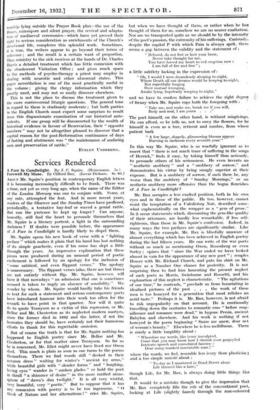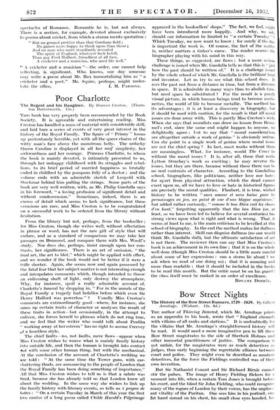Services Rendered
A Face in Candlelight. By J. C. Squire. (Heinemann. !is.) Farewell My Muse. By Clifford Bax. (Lovat Dickson. 8s. 6c1.) ABOUT Mr. Squire's position in contemporary English letters it is becoming increasingly difficult to be frank. There was a time, not yet so very long ago, when the name of the Editor of the London Mercury was one to conjure with. Some, at any rate, attempted the feat. And in more recent years, readers of the Observer and the Sunday Times have proffered, periodically, a tentative bay-leaf or waved a genial rattle. But can the pretence be kept up longer ? Can anyone, honestly, still find the heart to persuade themselves that Mr. Squire is a literary portent, a light in the surrounding darkness ? If doubts were possible before, the appearance of A Face in Candlelight is hardly likely to dispel them.
Mr. Squire opens his new book of verse with a " fighting preface " which makes it plain that his hand has lost nothing of its simple gaucherie, even if his muse has slept a little through the years. An impressive explanation that these pieces were produced during an unusual period of poetic excitement is followed by an apology for the inclusion of " some satirical, and even flippant verses." The apology is unnecessary. The flippant verses (alas, there are but three) are not entirely without flip. Mr. Squire, however, will have it that nowadays " an admission that one is sometimes amused is taken to imply an absence of sensibility." We wonder by whom. Mr. Squire would hardly take his friends as text for such a statement and serious contemporary poets have introduced humour into their work too often for the remark to have point in that quarter. Nor will it quite do to quote Tennyson as a victim of this repression, or Mr.' Belloe and Mr. Chesterton as its neglected modern martyrs, since the former died in 1892 and the latter, if not the laureates they should be, have certainly not their humorous efforts to thank for this regrettable omission.
But of course the truth is that for Mr. Squire nothing has happened to English poetry since Mr. Belloc and Mr.
Chesterton, or for that matter since Tennyson. So far as he is concerned, Mr. Eliot might never have lived nor Owen died. This much is plain as soon as one turns to the poems themselves. There we find woods still " decked in their autumn dress " waiting for winter's " ancient icy arms," while beautiful girls with " slender forms " and " laughing, loving eyes " wander in " sunken glades " or hold the poet in thrall " a shimmer of desire " in the more rarified atmo- sphere of " dawn's dim twilight." It is all very wistful, very beautiful, very " poetic." But to suppose that it has allY connexion with poetry is to be too ingenuous. " 0 think of Nature and her alternations 1" cries Mr. Squire, but when we have thought of them, or rather when he has thought of them for us, somehow we are no nearer exaltation.
Nor are we transported quite as we should be by the intensity of the poet's passion, the extremity of his sufferings. Curiously, despite the capital P with which Pain is always spelt, there seems a gap between the validity and the statement of : " Beloved, do not fret or knit your brow, Never take thought for me, You have forced my heart to red eruption now : I am full of fire and free "; a little subtlety lacking in the expression of : " Oh, I would I were dreamlessly sleeping to-night, Where Death all our dreams would be keeping to-night, Not regretfully longing Over mutual wronging, Awake lying, hopelessly weeping to-night," and we have to confess failure to achieve the right degree of frenzy. when Mr. Squire caps both the foregoing with : " Take me, and make me, break ine If you will, Body and soul, I am yours . . ."
The poet himself, on the other hand, is without misgivings. He can afford, so he- tells us, not to envy the flowers, for he himself is even as a tree, reticent and sombre, from whose patient bark " A few large, shapely, glimmering blooms appear Burning in darkness every seventh year."
In this way Mr. Squire, who is so woefully ignorant as to assert that " there is not much trace of suffering in the songs of Herrick," finds it easy, by taking himself thus seriously, to persuade others of his seriousness. He even invents an " aesthetic snobbery " and a " snobbery of sorrow," and demonstrates his virtue by being smugly superior at their expense. But is a snobbery of sorrow, if such there be, any worse than the snobbery of " Sunday Mornings," or an
aesthetic snobbery more offensive than the bogus flourishes of A Face in Candlelight ?
Mr. Bax occupies a less exalted position, both in his own eyes and in those of the public. He too, however, cannot resist the temptation of a Valedictory Note, described some-
what euphemistically on the wrapper as a " gem of prose." In it occur statements which, discounting the gem-like quality of their utterance, are hardly less remarkable, if less self- righteous, than those in Mr. Squire's confession. Indeed, in many ways the two prefaces are significantly similar. Like Mr. Squire, for example, Mr. Bax is blissfully unaware of almost everything which has been achieved in English poetry during the last fifteen years. He can write of the war poets without so much as mentioning Owen, Rosenberg or even Sorley ; opines that since the War ended we have looked almost in vain for the appearance of any new poet " ; couples Homer with Mr. Richard Church, and puts his shirt on Mr.
Squire as a Number One chance for posterity. It is not surprising then to find him lamenting the present neglect of such poets as Morris, Swinburne and Rossetti, and his explanation of this neglect is characteristic. " The agitations of our time," he contends, " preclude us from luxuriating in idealized pictures of the past . . . the work of these men is too honeyed for a generation that most relishes an acrid taste." Perhaps it is. Mr. Bax, however, is not afraid to risk unpopularity on that account. He is continually travelling down the centuries to romantic eras " before mag- nificence and romance were dead," in bygone Persia, ancient Babylon and elsewhere. And his work is nothing if not honeyed in the poem beginning " Snare me anew, dear net of woman's beauty." Elsewhere he is less mellifluous. There is surely a little turgidity about : " Wherefore my words, like ivory insculpted, Come that you may know how I cherish your gargoyled Intricate speech and convoluted fancies— Dear many-masked inscrutable man ! "
where the words, we feel, resemble less ivory than plasticine ; and a too simple naiveté about :
" To-day as I sauntered in Bond Street alone Life thinned like a haze," though Life, for Mr. Bax, is always doing little things like that.
It would be a mistake though to give the impression that Mr. Bax completely fills the r6le of the conventional poet,
looking at Life (slightly hazed) through the rose-coloured spectacles of Romance. Romantic he is, but not always. There is a section, for example, devoted almost exclusively to poems about cricket, from which a stanza merits quotation : " But no ground prettier than that Corsham field ; No games more happy to think upon than those ; And no man who more steadfastly revealed The spirit of England, whatever luck befell, Than gay Fred Hulbert, friendliest of all foes, A cricketer and a musician, who used life well."
" A cricketer and a musician "—the order, one cannot help reflecting, is significant. Who knows, one day someone may write a poem about Mr. Bax immortalizing him as " a cricketer and a poet." Mr. Squire, perhaps, might under-































 Previous page
Previous page